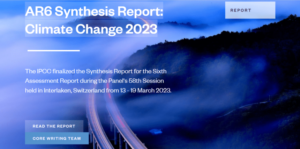
Table of Contents
IPCC (The Intergovernmental Panel on Climate Change) was founded in 1988 by world meteorological society and an organisation United Nations environment programme in order to provide decision makers with periodic review of the science behind climate change impacts and future threats, e.g., customization and mitigation options, which is exactly the main concern at present.
What does IPCC Report Mean for India?
The Intergovernmental Panel on Climate Change (IPCC) is the United Nations body for assessing the science related to climate change.
The Intergovernmental Panel on Climate Change released a report currently that basically warns the global countries against their development technique, which is actually leaving a bad impression on climate and has resulted in the destruction of our climate system, where carbon dioxide and many hazardous gases will destroy the Earth or our planet, and in order to combat this, every country will have to come forward with the implementation of policies on climate, rather than just policy in words.
Sixth Assessment Report 2023-
The IPCCs assessments provide governments at all levels with a scientific basis for climate-related development guidelines and form the basis for negotiations at the United Nations Climate Change Conference (United Nations Framework Convention on Climate Change, or UNFCCC).
Assessments are politically relevant but not prescriptive: they can provide projections of future climate change based on different scenarios, e.g., climate change threats, and discuss the impact of response options, but not notifications inform decision-makers about the measures to be taken.
IPCC Sixth Synthesis Report: All you need to know
The IPCC is currently working on the final part of the sixth assessment report, a synthesis report that will bring together the results of the three assessments carried out by the working group and three special reports from 2018 and 2019. Release is scheduled for March 2023.
IPCC Concerning Point Over the Environment
The IPCC states that there is more than 50% chance that the global temperature rise will reach or exceed 1.5 degree to 7 degrees F in between 2021 and 2040. In all scenarios studied, especially on the high emissions pathway, the world could reach this threshold even earlier, between 2018 and 2037.
Human-caused global warming of 1.1°C has caused climate change on Earth unprecedented in recent human history.
With a global temperature rise of 1.1 degrees Celsius (2 degrees Fahrenheit), all regions of the world are already seeing changes in the climate system not observed for centuries or millennia, from rising sea levels to more extreme weather events and the rapid disappearance of sea ice.
Impact alert
The impacts of climate change on people and ecosystems are more widespread and severe than expected, and future threats will increase exponentially with every fraction of a degree of warming. Global temperature rise from 1.5 degrees C which is actually critical and dangerous for all mankind.
For example, with this warming, 950 million people in the dry world will suffer from water scarcity, heat stress, and desertification, while the percentage of the world’s population at risk of flooding will increase by 24%.
Adaptation action does indeed build resilience, but more resources are required in order to adapt a solution. 170 countries have adapted the solutions now, but practically few have been left to implement such efforts. In order to keep the short and immediate effect of the environment, a collaborative measure is required for the global good.
What is the main problem under IPCC?
IPCC five reason for concern are threat to threatened species and unique system , damage from extreme climate , global effect and evaluation report, essential input to international negotiation to combat with climate change.
With 195 members, the IPCC was founded by the United Nations Environment Programme.
Which was supported by WTO and UNEP there are viable and effective options for reducing greenhouse gas emissions and adapt to human caused climate change.
Alternatives and solution
Other significant environmental announcements by the minister include a funding gap for the feasibility of a battery energy storage system, an intergovernmental transmission scheme to evacuate and supplement Ladakh’s renewable energy grid, a green credit scheme, a promotion of alternative fertilisers, 500 new ‘waste to the factories of wealth, and Rs 19,700 crores (Rs 197 billion) for the National Green Hydrogen Mission.
The Union Minister also announced the extension of the tariff exemption for imports of capital goods and equipment required for the manufacture of lithium-ion cells for electric vehicle batteries.
Parveen Kumar, Senior Electric Mobility Programme Manager, WRI India, appreciates this decision and says that lithium-ion batteries (LIBs) are an important part of electric vehicles (EVs) and are emerging as battery energy storage systems (BESSs) favoured by large corporations for scaled vehicle applications. Penetration of renewable energy (solar and wind).
IPCC SYNTHESIS REPORT Summary for Policymakers
IPCC Press Release AR6 Synthesis Report
Also, Read- INDIRA AWAS YOJANA SCHEME
